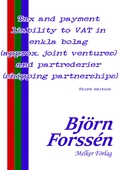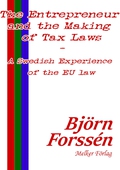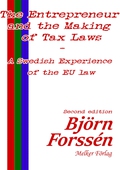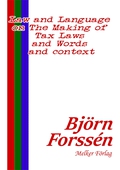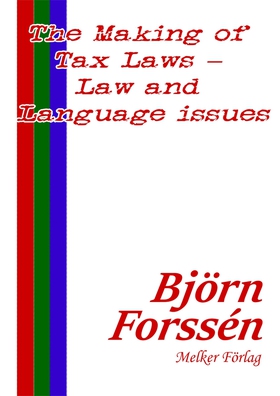
Lägg till önskelistan
The Making of Tax Laws – Law and Language issues e-bok
Pris
65 kr
The Making of Tax Laws – Law and Language issues, is an edited offprint of Part D of The Entrepreneur and the Making of Tax Laws – A Swedish Experience of the EU law: Second edition, by the same author. In that book The Making of Tax Laws, meaning fiscal sociology aspects on the tax rules as such, was presented as a new branch of fiscal sociology concerning certain aspects regarding the making of tax laws (not to be confused with the making of tax law).
This book concerns Communication Disto...
E-Bok
65 kr
Pris
Förlag
Melker Förlag
Utgiven
26 Januari 2016
Genrer
Juridik, Fackböcker
Språk
English
Format
pdf
Kopieringsskydd
Vattenmärkt
ISBN
9789176152089
The Making of Tax Laws – Law and Language issues, is an edited offprint of Part D of The Entrepreneur and the Making of Tax Laws – A Swedish Experience of the EU law: Second edition, by the same author. In that book The Making of Tax Laws, meaning fiscal sociology aspects on the tax rules as such, was presented as a new branch of fiscal sociology concerning certain aspects regarding the making of tax laws (not to be confused with the making of tax law).
This book concerns Communication Distortions within tax rules and Use of language in law. The underlying issue concerns how communication distortions occur between the legislator’s intentions with tax rules and the perception of them within a general context of the use of language in law. The main issue in this book concerns reasoning from the linguistic law and language perspective about why a text containing e.g. an imperative to pay tax may as such make a poor tool to convey that intention of the legislator to the tax subject, e.g. to an entrepreneur. A resulting question is whether there’s any pedagogy to support a decrease of a risk of the described communication distortions occurring by way of a method of text processing that makes the final text – making the present tax rule – more likely to correspond in terms of communicative precision with the legislator’s intention.
Thus, this book chiefly concerns avoiding the described communication distortions by first and foremost avoiding textual imperfections in the mentioned communicative respect regarding the making of tax laws. The focus is set more on the language issue itself than on imperfections in the system which is supposed to convey the legislator’s intentions with tax rules.
Mr. Björn Forssén is a Swedish Doctor of Laws.
For more info about this book and other books on Pedagogiskt Forum Skatt (Pedagogy Forum Tax), see www.forssen.com

